三国演义开篇词英文赏析
- 格式:pptx
- 大小:1.11 MB
- 文档页数:8
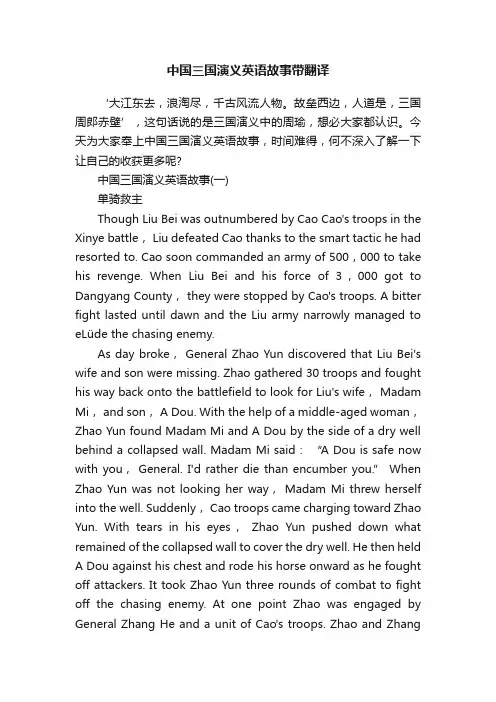
中国三国演义英语故事带翻译‘大江东去,浪淘尽,千古风流人物。
故垒西边,人道是,三国周郎赤壁’,这句话说的是三国演义中的周瑜,想必大家都认识。
今天为大家奉上中国三国演义英语故事,时间难得,何不深入了解一下让自己的收获更多呢?中国三国演义英语故事(一)单骑救主Though Liu Bei was outnumbered by Cao Cao's troops in the Xinye battle, Liu defeated Cao thanks to the smart tactic he had resorted to. Cao soon commanded an army of 500,000 to take his revenge. When Liu Bei and his force of 3,000 got to Dangyang County, they were stopped by Cao's troops. A bitter fight lasted until dawn and the Liu army narrowly managed to eLüde the chasing enemy.As day broke, General Zhao Yun discovered that Liu Bei's wife and son were missing. Zhao gathered 30 troops and fought his way back onto the battlefield to look for Liu's wife, Madam Mi, and son, A Dou. With the help of a middle-aged woman,Zhao Yun found Madam Mi and A Dou by the side of a dry well behind a collapsed wall. Madam Mi said:“A Dou is safe now with you,General. I'd rather die than encumber you.” When Zhao Yun was not looking her way,Madam Mi threw herself into the well. Suddenly, Cao troops came charging toward Zhao Yun. With tears in his eyes,Zhao Yun pushed down what remained of the collapsed wall to cover the dry well. He then held A Dou against his chest and rode his horse onward as he fought off attackers. It took Zhao Yun three rounds of combat to fight off the chasing enemy. At one point Zhao was engaged by General Zhang He and a unit of Cao's troops. Zhao and Zhangfought a dozen rounds and Zhao tried to break the siege. But Zhao Yun and his horse unexpectedly fell into a trap. Just as Zhang He charged to pierce Zhao Yun with his spear,Zhao's horse leapt out of the trap. Zhang He was taken aback by the sudden move and his horse backed off several gaits. Zhao Yun fought Cao's generals and troops single-handedly. No one could get close to him. Cao Cao, who was watching the battle from a nearby hilltop, ordered that Zhao Yun be captured alive. Zhao Yun made the most of Cao's no-kill order and broke through the siege in the end. When he returned to his camp,Zhao Yun handed the young master to Liu Bei.新野一战,刘备以少胜多打败曹操,曹操引五十万大宫前来报仇。
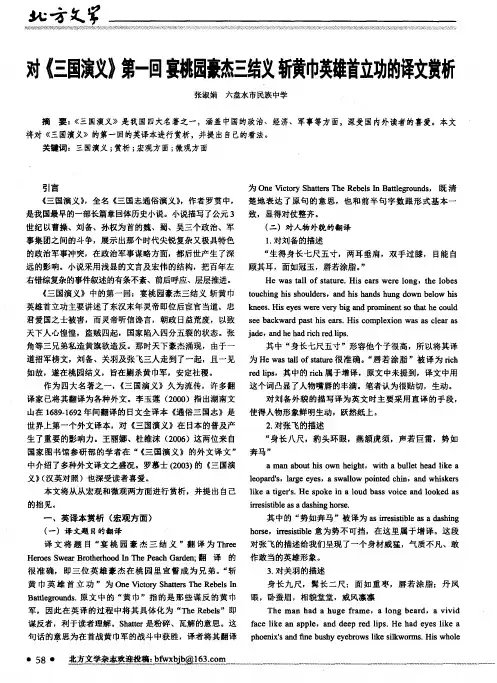
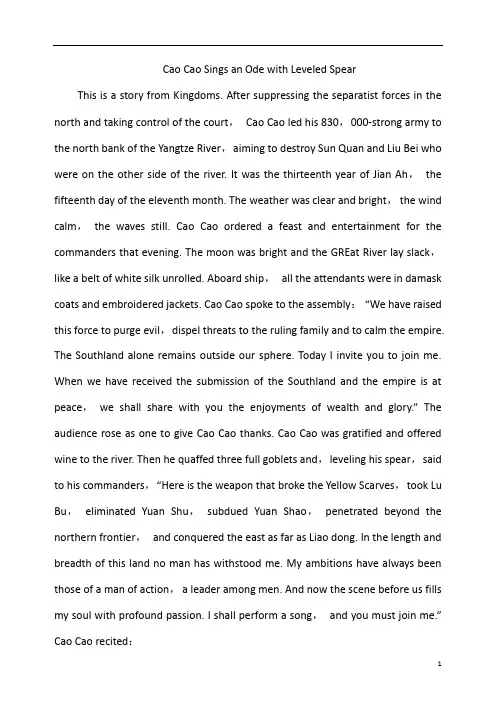
Cao Cao Sings an Ode with Leveled SpearThis is a story from Kingdoms. After suppressing the separatist forces in the north and taking control of the court,Cao Cao led his 830,000-strong army to the north bank of the Yangtze River,aiming to destroy Sun Quan and Liu Bei who were on the other side of the river. It was the thirteenth year of Jian Ah,the fifteenth day of the eleventh month. The weather was clear and bright,the wind calm,the waves still. Cao Cao ordered a feast and entertainment for the commanders that evening. The moon was bright and the GREat River lay slack,like a belt of white silk unrolled. Aboard ship,all the attendants were in damask coats and embroidered jackets. Cao Cao spoke to the assembly:“We have raised this force to purge evil,dispel threats to the ruling family and to calm the empire. The Southland alone remains outside our sphere. Today I invite you to join me. When we have received the submission of the Southland and the empire is at peace,we shall share with you the enjoyments of wealth and glory.” The audience rose as one to give Cao Cao thanks. Cao Cao was gratified and offered wine to the river. Then he quaffed three full goblets and,leveling his spear,said to his commanders,“Here is the weapon that broke the Y ellow Scarves,took Lu Bu,eliminated Yuan Shu,subdued Yuan Shao,penetrated beyond the northern frontier,and conquered the east as far as Liao dong. In the length and breadth of this land no man has withstood me. My ambitions have always been those of a man of action,a leader among men. And now the scene before us fills my soul with profound passion. I shall perform a song,and you must join me.” Cao Cao recited:Here before us,wine and song!For man does not live long.…It southbound circles thrice a tree,That offers him no haven.the mountaintop no beight eschews,the sea eschews no deep.And the Duke of Zhou spat out his meal,An empire's trust to keep.As Cao Cao finished,Liu Fu,an imperial inspector,pointed out ominous words in the ode. Cao Cao,already drunk at that time,pierced Liu Fu through with his spear,killing him. Lin Fu's words were proved later in the battle at Chibi,where Cao Cao almost lost his life.横槊赋诗曹操平定了北方割据势力,控制了朝政。
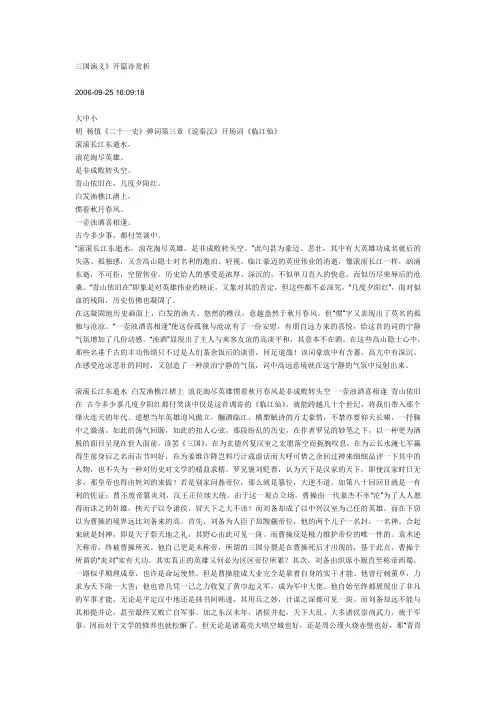
三国演义》开篇诗赏析2006-09-25 16:09:18大中小明杨慎《二十一史》弹词第三章《说秦汉》开场词《临江仙》滚滚长江东逝水,浪花淘尽英雄。
是非成败转头空。
青山依旧在,几度夕阳红。
白发渔樵江渚上,惯看秋月春风。
一壶浊酒喜相逢。
古今多少事,都付笑谈中。
“滚滚长江东逝水,浪花淘尽英雄。
是非成败转头空。
”此句甚为豪迈、悲壮,其中有大英雄功成名就后的失落、孤独感,又含高山隐士对名利的澹泊、轻视。
临江豪迈的英世伟业的消逝,像滚滚长江一样,汹涌东逝,不可拒,空留伟业。
历史给人的感受是浓厚、深沉的,不似单刀直入的快意,而似历尽荣辱后的沧桑。
“青山依旧在”即象是对英雄伟业的映证,又象对其的否定,但这些都不必深究,“几度夕阳红”,面对似血的残阳,历史仿佛也凝固了。
在这凝固地历史画面上,白发的渔夫、悠然的樵汉,意趣盎然于秋月春风。
但“惯”字又表现出了莫名的孤独与沧凉。
“一壶浊酒喜相逢”使这份孤独与沧凉有了一份安慰,有朋自远方来的喜悦,给这首的词的宁静气氛增加了几份动感。
“浊酒”显现出了主人与来客友谊的高淡平和,其意本不在酒。
在这些高山隐士心中,那些名垂千古的丰功伟绩只不过是人们荼余饭后的谈资,何足道哉!该词豪放中有含蓄,高亢中有深沉。
在感受沧凉悲壮的同时,又创造了一种淡泊宁静的气氛,词中高远意境就在这宁静的气氛中反射出来。
滚滚长江东逝水白发渔樵江楮上浪花淘尽英雄惯看秋月春风是非成败转头空一壶浊酒喜相逢青山依旧在古今多少事几度夕阳红都付笑谈中仅是这首调寄的《临江仙》,就能跨越几十个世纪,将我们带入那个烽火连天的年代。
遥想当年英雄迎风傲立,酾酒临江,横槊赋诗的万丈豪情,不禁亦要仰天长啸,一抒胸中之激荡。
如此的荡气回肠,如此的扣人心弦。
那段纷乱的历史,在作者罗兄的妙笔之下,以一种更为洒脱的面目呈现在世人面前。
读罢《三国》,在为玄德兴复汉室之宏愿落空而扼腕叹息,在为云长水淹七军赢得生前身后之名而击节叫好,在为姜维诈降岂料巧计成虚话而大呼可惜之余回过神来细细品评一下其中的人物,也不失为一种对历史对文学的精益求精。
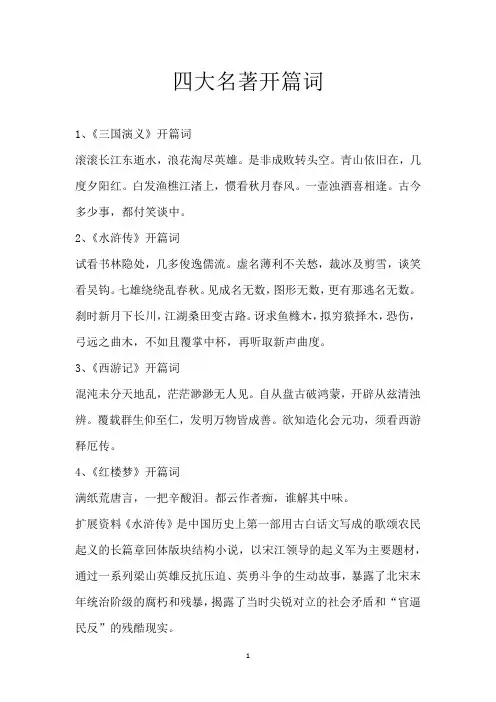
四大名著开篇词1、《三国演义》开篇词滚滚长江东逝水,浪花淘尽英雄。
是非成败转头空。
青山依旧在,几度夕阳红。
白发渔樵江渚上,惯看秋月春风。
一壶浊酒喜相逢。
古今多少事,都付笑谈中。
2、《水浒传》开篇词试看书林隐处,几多俊逸儒流。
虚名薄利不关愁,裁冰及剪雪,谈笑看吴钩。
七雄绕绕乱春秋。
见成名无数,图形无数,更有那逃名无数。
刹时新月下长川,江湖桑田变古路。
讶求鱼橼木,拟穷猿择木,恐伤,弓远之曲木,不如且覆掌中杯,再听取新声曲度。
3、《西游记》开篇词混沌未分天地乱,茫茫渺渺无人见。
自从盘古破鸿蒙,开辟从兹清浊辨。
覆载群生仰至仁,发明万物皆成善。
欲知造化会元功,须看西游释厄传。
4、《红楼梦》开篇词满纸荒唐言,一把辛酸泪。
都云作者痴,谁解其中味。
扩展资料《水浒传》是中国历史上第一部用古白话文写成的歌颂农民起义的长篇章回体版块结构小说,以宋江领导的起义军为主要题材,通过一系列梁山英雄反抗压迫、英勇斗争的生动故事,暴露了北宋末年统治阶级的腐朽和残暴,揭露了当时尖锐对立的社会矛盾和“官逼民反”的残酷现实。
《三国演义》故事开始黄巾兵起义,结束于司马氏灭吴开晋,以描写战争为主,反映了魏、蜀汉、吴三个政治集团之间的政治和军事斗争,展现了从东汉末年到西晋初年之间近一百年的历史风云,并成功塑造了一批叱咤风云的英雄人物。
《西游记》前七回叙述孙悟空出世,有大闹天宫等故事。
此后写孙悟空随唐僧西天取经,沿途除妖降魔、战胜困难的故事。
书中唐僧、孙悟空、猪八戒、沙僧等形象刻画生动,规模宏大,结构完整,并且《西游记》富有浓厚的佛教色彩,其隐含意义非常深远,众说纷纭,见仁见智。
可以从佛、道、俗等多个角度欣赏,是中国古典小说中伟大的浪漫主义文学作品。
《红楼梦》讲述的是发生在一个虚构朝代的封建大家庭中的人事物,其中以贾宝玉、林黛玉、薛宝钗三个人之间的感情纠葛为主线通过对一些日常事件的描述体现了在贾府的大观园中以金陵十二钗为主体的众女子的爱恨情愁。

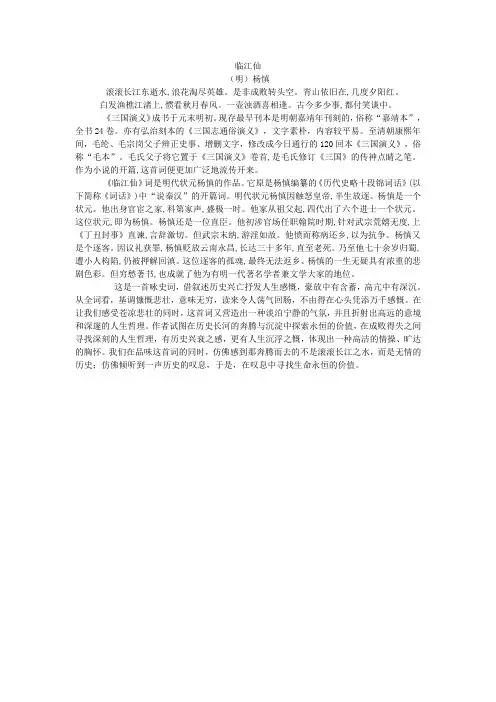
临江仙(明)杨慎滚滚长江东逝水,浪花淘尽英雄。
是非成败转头空。
青山依旧在,几度夕阳红。
白发渔樵江渚上,惯看秋月春风。
一壶浊酒喜相逢。
古今多少事,都付笑谈中。
《三国演义》成书于元末明初。
现存最早刊本是明朝嘉靖年刊刻的,俗称“嘉靖本”,全书24卷。
亦有弘治刻本的《三国志通俗演义》,文字素朴,内容较平易。
至清朝康熙年间,毛纶、毛宗岗父子辨正史事、增删文字,修改成今日通行的120回本《三国演义》,俗称“毛本”。
毛氏父子将它置于《三国演义》卷首,是毛氏修订《三国》的传神点睛之笔。
作为小说的开篇,这首词便更加广泛地流传开来。
《临江仙》词是明代状元杨慎的作品。
它原是杨慎编纂的《历代史略十段锦词话》(以下简称《词话》)中“说秦汉”的开篇词。
明代状元杨慎因触怒皇帝,半生放逐。
杨慎是一个状元。
他出身官宦之家,科第家声,盛极一时。
他家从祖父起,四代出了六个进士一个状元。
这位状元,即为杨慎。
杨慎还是一位直臣。
他初涉官场任职翰院时期,针对武宗荒嬉无度,上《丁丑封事》直谏,言辞激切。
但武宗末纳,游淫如故。
他愤而称病还乡,以为抗争。
杨慎又是个逐客。
因议礼获罪,杨慎贬放云南永昌,长达三十多年,直至老死。
乃至他七十余岁归蜀,遭小人构陷,仍被押解回滇。
这位逐客的孤魂,最终无法返乡。
杨慎的一生无疑具有浓重的悲剧色彩。
但穷愁著书,也成就了他为有明一代著名学者兼文学大家的地位。
这是一首咏史词,借叙述历史兴亡抒发人生感慨,豪放中有含蓄,高亢中有深沉。
从全词看,基调慷慨悲壮,意味无穷,读来令人荡气回肠,不由得在心头凭添万千感慨。
在让我们感受苍凉悲壮的同时,这首词又营造出一种淡泊宁静的气氛,并且折射出高远的意境和深邃的人生哲理。
作者试图在历史长河的奔腾与沉淀中探索永恒的价值,在成败得失之间寻找深刻的人生哲理,有历史兴衰之感,更有人生沉浮之慨,体现出一种高洁的情操、旷达的胸怀。
我们在品味这首词的同时,仿佛感到那奔腾而去的不是滚滚长江之水,而是无情的历史;仿佛倾听到一声历史的叹息,于是,在叹息中寻找生命永恒的价值。
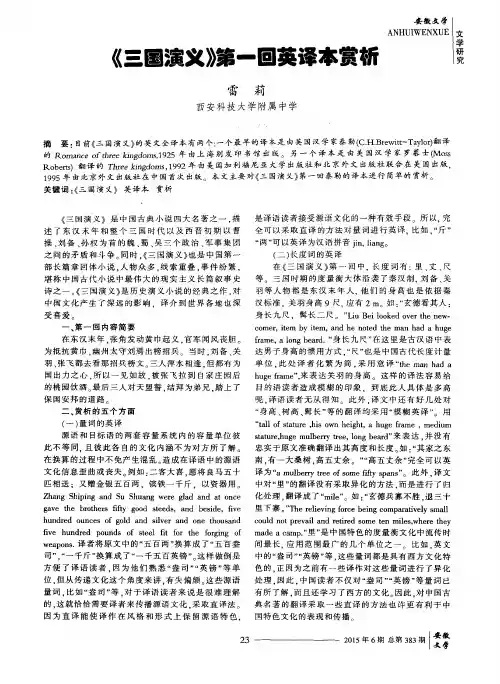

三国演义开篇词——(临江仙·滚滚长江东逝水》杨慎(明)♦ 2 0 0 6 年2月21日《北京青年报》版《淹没在崇文门内社区的古迹》一文说: “许多人也许不知道杨慎的名字,但提起电视连续剧《三国演义》的插曲:‘滚滚长江东逝水,浪花淘尽英雄……’应是妇孺皆知,那‘歌词’写于五百年前,作者便是这位杨慎。
词牌名为‘临江仙’被罗贯中用作小说《三国演义》的开篇。
♦词牌名为‘临江仙’,被罗贯中用作小说《三国演义》的开篇词。
”《三国演义》的开篇词《江仙》的确系杨慎所作。
然而说罗贯中用杨慎的《临江仙》作为《三国演义》的开篇词却是“前人吟出后人句”罗贯中生卒年代无考,大约生活在1 33 0 年一1 4 0 0 年前后,即元末明初,名本(一说名贯),字贯中,号湖海散人,钱塘(今浙江省杭州市)人,一说山西太原人。
他创作的小说据说有几十部,但大都没有流传下来。
杨慎死后一百多年的清康熙年间,毛纶(字德音,号声山)、毛宗岗( 字序始,号孑庵)父子将罗贯中的《三国演义》加以修订评刻,我们今夭看到的《三国演义》就是他们的评刻本,书中诸如“后人有诗叹曰”(或“赞日”)一类语句就是毛氏父子所加。
杨慎的《临江仙》词(滚滚长江东逝水)则被毛氏父子作为《三国演义》的开篇词。
在中国古代的知识分子中,有一类人,他们的生命仿佛受到天地造化的特别眷顾,一来到这个世界上,就有着常人不能企及的优势;他们或出身名门,或世代书香。
天资超凡,才华出众。
幼年即早慧盛名一方,及至科考,一举夺魁,名震天下。
入朝为官,踏青云如履平地;得高爵似拾草芥。
出入宫廷,君王青睐,视为国之栋梁;公卿逢迎,如群星俯仰皓月。
这样的身世经历,这样的少年得志,自然使他在人生中有非凡的英雄志向和远大的功业理想。
而自幼就接受的以天下为己任、忠君报国、格守君臣之道的儒家文化教育,又强化了他们的政治人格、伦理操守。
由此,他们在仕途功业的进取中,一旦面临发生了超常的国事政局,他就敢于做出超凡的政治举动—抗命君王,怜逆圣意。
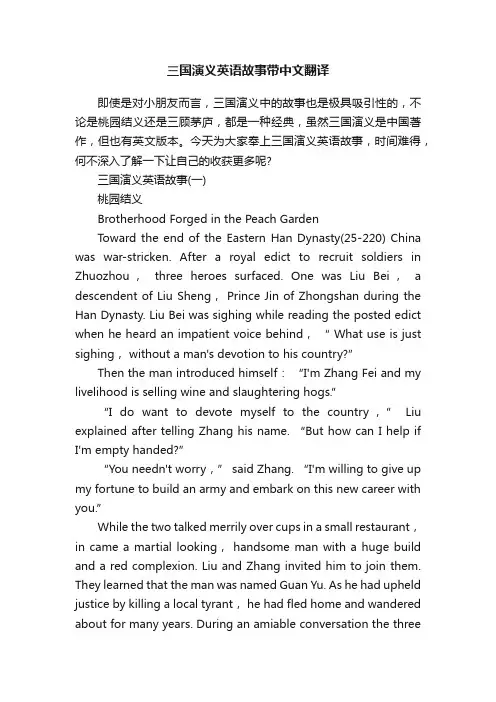
三国演义英语故事带中文翻译即使是对小朋友而言,三国演义中的故事也是极具吸引性的,不论是桃园结义还是三顾茅庐,都是一种经典,虽然三国演义是中国著作,但也有英文版本。
今天为大家奉上三国演义英语故事,时间难得,何不深入了解一下让自己的收获更多呢?三国演义英语故事(一)桃园结义Brotherhood Forged in the Peach GardenToward the end of the Eastern Han Dynasty(25-220) China was war-stricken. After a royal edict to recruit soldiers in Zhuozhou,three heroes surfaced. One was Liu Bei, a descendent of Liu Sheng, Prince Jin of Zhongshan during the Han Dynasty. Liu Bei was sighing while reading the posted edict when he heard an impatient voice behind,“ What use is just sighing,without a man's devotion to his country?”Then the man introduced himself:“I'm Zhang Fei and my livelihood is selling wine and slaughtering hogs.”“I do wan t to devote myself to the country,” Liu explained after telling Zhang his name. “But how can I help if I'm empty handed?”“You needn't worry,” said Zhang. “I'm willing to give up my fortune to build an army and embark on this new career with you.”While the two talked merrily over cups in a small restaurant,in came a martial looking, handsome man with a huge build and a red complexion. Liu and Zhang invited him to join them. They learned that the man was named Guan Yu. As he had upheld justice by killing a local tyrant, he had fled home and wandered about for many years. During an amiable conversation the threefound that they shared a common ambition and the next day in a peach garden they swore brotherhood to heaven and earth before lit candles and joss sticks, Liu Bei the eldest, Guan Yu the second-oldest and Zhang Fei the youngest. They vowed devotion to China. Later,the three sworn brothers had successful career. Liu Bei ascended to the throne of the State of Shu in 221A.D in present-day Sichuan.东汉(25 -220年)末年,天下大乱。
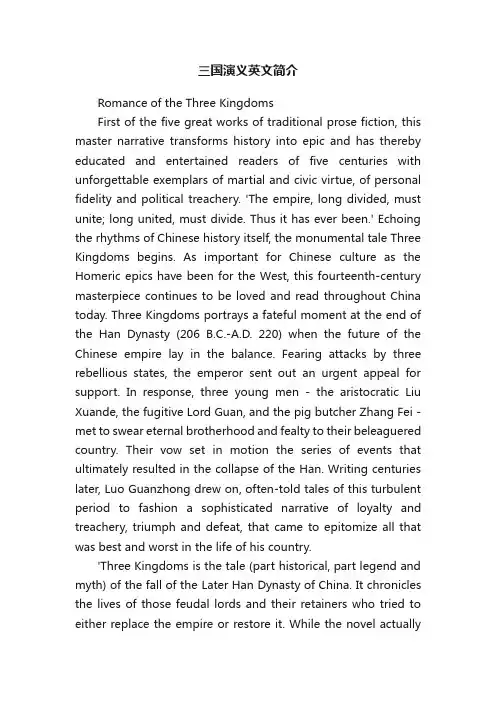
三国演义英文简介Romance of the Three KingdomsFirst of the five great works of traditional prose fiction, this master narrative transforms history into epic and has thereby educated and entertained readers of five centuries with unforgettable exemplars of martial and civic virtue, of personal fidelity and political treachery. 'The empire, long divided, must unite; long united, must divide. Thus it has ever been.' Echoing the rhythms of Chinese history itself, the monumental tale Three Kingdoms begins. As important for Chinese culture as the Homeric epics have been for the West, this fourteenth-century masterpiece continues to be loved and read throughout China today. Three Kingdoms portrays a fateful moment at the end of the Han Dynasty (206 B.C.-A.D. 220) when the future of the Chinese empire lay in the balance. Fearing attacks by three rebellious states, the emperor sent out an urgent appeal for support. In response, three young men - the aristocratic Liu Xuande, the fugitive Lord Guan, and the pig butcher Zhang Fei - met to swear eternal brotherhood and fealty to their beleaguered country. Their vow set in motion the series of events that ultimately resulted in the collapse of the Han. Writing centuries later, Luo Guanzhong drew on, often-told tales of this turbulent period to fashion a sophisticated narrative of loyalty and treachery, triumph and defeat, that came to epitomize all that was best and worst in the life of his country.'Three Kingdoms is the tale (part historical, part legend and myth) of the fall of the Later Han Dynasty of China. It chronicles the lives of those feudal lords and their retainers who tried to either replace the empire or restore it. While the novel actuallyfollows literally hundreds of characters, the focus is mainly on the 3 families who would eventually carve out the 3 kingdoms from the remnants of the Han. The Liu family in the Shu kingdom led by Liu Bei, The Cao family in Wei led by Cao Cao, and the Sun family in Wu eventually led by Sun Quan. The book deals with the plots, personal and army battles, intrigues, and struggles of these families to achieve dominance for almost 100 yrs. This book also gives you a sense of the way the Chinese view their history: cyclical rather than linear (as in the West). The first and last lines of the book sum this view up best: 'The empire long united must divide...' and 'The empire long divided must unite...' If you are at least a little interested in Chinese history (ancient or modern) and culture this book is a must read.'这不知道行不行?!。
三国演义第一回中的好词好句英文回答:In the first chapter of the novel "Romance of the Three Kingdoms," there are several memorable phrases and sentences that stand out. One of the most famous lines comes from the opening paragraph: "The empire, long divided, must unite; long united, must divide." This line captures the central theme of the novel, which is the rise and fallof different dynasties and the constant struggle for power.Another notable line is when the scholar Kong Rong says, "When the waters rise, the boat floats high; when thewaters recede, the boat sinks low." This is a metaphor that Kong Rong uses to describe his ability to adapt to changing circumstances. It implies that one must be flexible and adaptable in order to succeed in life.There are also many colorful idioms and expressionsused throughout the chapter. For example, when the warlordYuan Shao is described as having "the bearing of a dragon and the gaze of a tiger," it paints a vivid picture of his powerful and imposing presence. Another idiom that is usedis "to kill the chicken to scare the monkey." This means to make an example out of someone in order to warn others andis used to describe the actions of the warlord Dong Zhuo, who executes a minor official to intimidate others.Overall, the first chapter of "Romance of the Three Kingdoms" is filled with memorable phrases, vivid descriptions, and colorful idioms that bring the story to life.中文回答:《三国演义》第一回中有许多值得铭记的词句。
介绍三国演义英文演讲稿Ladies and gentlemen,Today, I would like to talk to you about one of the most well-known and influential Chinese literary works of all time - "Romance of the Three Kingdoms.""Romance of the Three Kingdoms," also known as "Three Kingdoms," is an epic historical novel written by Luo Guanzhong during the 14th century. It is based on the turbulent and chaotic period in Chinese history known as the Three Kingdoms period, which lasted from 220 to 280 AD.The novel follows the events that led to the fall of the Han Dynasty and the subsequent division of China into three rival kingdoms - Wei, Shu, and Wu. It is filled with thrilling battles, cunning political strategies, and complex characters.One of the most prominent figures in the novel is Liu Bei, a virtuous and righteous leader who establishes the Kingdom of Shu. Liu Bei's character embodies the Confucian ideals of benevolence, righteousness, and loyalty. His unwavering commitment to his cause and his willingness tohelp those in need make him a beloved hero in Chinese literature.Another well-known character is Cao Cao, the warlord who establishes the Kingdom of Wei and becomes one of the most powerful figures of the era. Cao Cao is portrayed as an ambitious and cunning strategist, willing to do whatever it takes to achieve his goals. Despite his ruthless tactics, he is also depicted as a highly intelligent and capable leader.Then there is Sun Quan, the ruler of the Kingdom of Wu. Sun Quan is portrayed as a shrewd and diplomatic leader, skilled in both warfare and politics. Though initially a minor figure in the novel, he rises to power and becomes a key player in the struggle for supremacy.Throughout the novel, the three kingdoms engage in fierce battles and intricate political maneuvering, with numerous alliances formed and broken. The novel showcases the fickle nature of human relationships and the consequences of greed and ambition."Romance of the Three Kingdoms" has not only entertained readers for centuries but has also exerted a great influence on Chinese culture and history. It is often studied as a valuable source for understanding the political and social dynamics of the Three Kingdoms period and hasinspired countless adaptations in various forms of media, including movies, TV dramas, and video games.In conclusion, "Romance of the Three Kingdoms" is a monumental work of literature that has captivated readers worldwide for centuries. It vividly portrays the turbulent times of the Three Kingdoms era, filled with heroic and cunning characters, thrilling battles, and complex political strategies. Its enduring popularity and influence make it a true masterpiece of Chinese literature. Thank you.。
三国演义英语读书报告80词-回复Title: Three Kingdoms - A Classic Epic Retold in EnglishIntroduction:Three Kingdoms, written by Luo Guanzhong during the Ming Dynasty, is one of the Four Great Classical Novels of Chinese literature. This historical epic is based on the events that occurred during the late Eastern Han Dynasty and the Three Kingdoms period in ancient China, spanning from the year 169 to 280. Translated into English, Three Kingdoms captures the essence of honor, loyalty, and strategical warfare, making it an enthralling read for both native English speakers and those interested in Chinese history.Summary:Three Kingdoms portrays the intricately woven storylines of power struggles, political alliances, and military tactics pursued by the feudal lords of that time. The narrative centers around three main protagonists: Liu Bei, Cao Cao, and Sun Quan, who each establish their kingdoms and vie for control over the entire realm.Discussion:1. Historical Context and References:Three Kingdoms provides a valuable insight into ancient Chinese history and is deeply rooted in historical events. It illustrates the decline of the Eastern Han Dynasty, the Yellow Turban Rebellion, the Battle of Red Cliffs, and the subsequent division of China into three rival kingdoms.2. Portrayal of Characters:Luo Guanzhong skillfully brings to life a rich ensemble of characters, each with their unique qualities, strengths, and flaws. From the noble and virtuous Liu Bei to the cunning and strategic Cao Cao, and the ambitious yet resilient Sun Quan, every character is masterfully depicted, making them relatable and memorable figures.3. Themes and Morals:Three Kingdoms explores various themes that are universally applicable. Honor, loyalty, betrayal, heroism, and the pursuit of power are all present within the narrative. Readers are prompted to reflect upon these themes and contemplate the consequences of actions and decisions made by the characters. The novel emphasizes the importance of wise governance and strategicplanning, providing valuable lessons for leadership.4. Literary Style:Luo Guanzhong's writing style is both descriptive and lyrical. The novel is filled with poetic verses, witty dialogues, and vivid descriptions of battles and political intrigues. The prose is engaging, compelling readers to immerse themselves in the exciting world of the Three Kingdoms.5. Cultural Significance:Three Kingdoms is not only a literary masterpiece but also a depiction of Chinese culture, values, and traditions. The novel explores the ancient Chinese societal structure, Confucian principles, and the importance of filial piety and ancestral worship.Conclusion:Three Kingdoms, skillfully translated into English, serves as an insightful and captivating introduction to Chinese history. With its well-rounded characters, epic battles, and timeless themes, readers can appreciate the brilliance of Luo Guanzhong's storytelling, gaining a deeper understanding of ancient China and its richcultural heritage. Whether read as a historical account or a thrilling tale of heroic leadership, Three Kingdoms offers an immersive experience that transcends cultural boundaries.。
有关三国演义英语作文写的开篇词语英文回答:The Romance of the Three Kingdoms, a historical novel attributed to Luo Guanzhong, is an epic tale set in 3rd century China during the twilight of the Han dynasty. Its vast cast of characters, intricate plots, and vivid battle scenes have captivated readers for centuries.One of the defining features of the novel is its use of language. Luo Guanzhong employed a rich vocabulary, employing a mix of classical Chinese and vernacular language. The narrative is punctuated with poeticinterludes and philosophical reflections, adding depth and complexity to the story.The opening words of the novel set the tone for the epic that follows:> "The empire, long divided, must unite; long united,must divide. Thus it has ever been."This famous opening line, known as the "Opening Statement" (起兴), encapsulates the overarching theme ofthe novel: the cyclical nature of history. It suggests that periods of unity and disunity are an inherent part of the human condition.中文回答:《三国演义》是一部由罗贯中撰写的历史小说,是一部史诗般的传说,背景设定在公元 3 世纪末的中国汉朝末年。
三国演义观后感名著片段英语英文回答:The Romance of the Three Kingdoms: An Epic Tale of Power, Loyalty, and Betrayal."The Romance of the Three Kingdoms," one of China's greatest literary masterpieces, is an epic saga that captures the turbulent era of the Three Kingdoms period (220-280 AD). This sprawling historical novel, written by Luo Guanzhong in the 14th century, chronicles the rise and fall of three rival kingdoms—Wei, Shu, and Wu—as they battle for control of a fractured China.At the heart of this epic tale is a cast ofunforgettable characters. The noble and charismatic Liu Bei, the sworn brother of Guan Yu and Zhang Fei, embodies the ideals of honor and loyalty. Cao Cao, the wily andambitious warlord, represents the darker side of power. Zhuge Liang, the brilliant strategist and advisor to LiuBei, showcases the wisdom and cunning necessary to navigate the treacherous world of war and politics.Through its vivid storytelling and complex characters, "The Romance of the Three Kingdoms" explores universal themes of power, loyalty, betrayal, and the human condition. The novel's depiction of the corrupting influence of power and the tragic consequences of ambition has resonated with readers for centuries. It is a story that celebratesheroism and sacrifice while also shedding light on the darker aspects of human nature.The novel's enduring popularity is a testament to its literary brilliance. Its intricate plot, engaging characters, and profound insights into human nature have made it a timeless masterpiece. Whether read in itsoriginal Chinese or in translation, "The Romance of the Three Kingdoms" continues to capture the imagination of readers worldwide.中文回答:三国演义,一部关于权力、忠诚与背叛的史诗。
《三国演义》的开篇词是《临江仙·滚滚长江东逝水》,是明代文学家杨慎所作。
其译文如下:
滚滚长江向东流去,不再回头,多少英雄像翻飞的浪花般消逝。
争什么是与非、成功与失败,都是短暂不长久。
只有青山依然存在,依然的日升日落。
江上白发渔翁,早已习惯于四时的变化。
和朋友难得见了面,痛快的畅饮一杯酒,古往今来的纷纷扰扰,都成为下酒闲谈的材料。
这首词表达了历史的无情和人生的无奈,同时也展现了作者对于英雄和名利的淡泊态度。
词中的“青山依旧在,几度夕阳红”寓意着历史的轮回和人生的短暂,而“白发渔樵江渚上,惯看秋月春风”则表现了作者对于世事的超脱和豁达。
整首词意境深远,富有哲理性和人生智慧,成为了中国文学的经典之作。